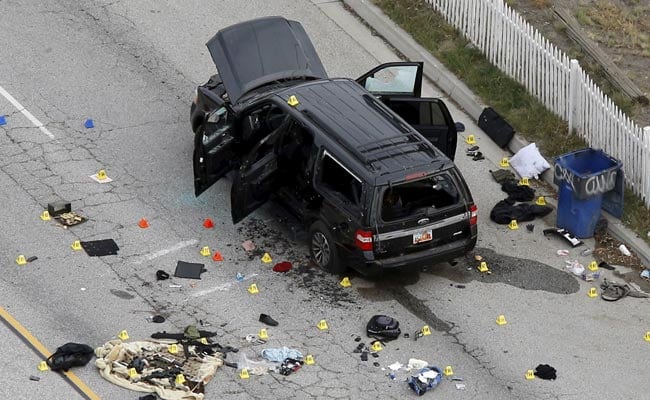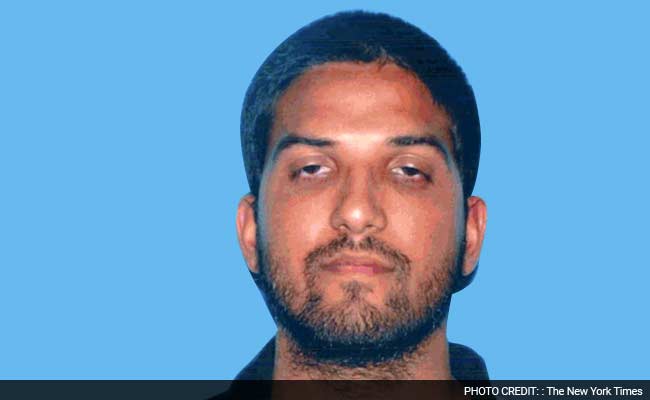
Contradictory claims have emerged from Pakistan and Saudi Arabia about where Tashfeen Malik spent her formative years.
Riyadh, Saudi Arabia:
As investigators work to determine the backgrounds and motivations of the married couple suspected in last week's mass shooting in San Bernardino, California, contradictory claims have emerged from Pakistan and Saudi Arabia about where the wife, Tashfeen Malik, spent her formative years.
Relatives and acquaintances of Malik in Pakistan said she grew up in Saudi Arabia and was influenced by its deeply conservative interpretation of Islam. But Saudi officials denied that she spent significant time in the kingdom, saying she visited only twice, for a few months in total.
The claims come as both countries, which have complicated relationships with the United States and have waged their own battles against Islamic militancy, seek to clear themselves of ties to the San Bernardino shootings, the worst terrorist attack on U.S. soil since Sept. 11, 2001. Both suspects were killed in a shootout with the police.
While the biography of the husband, Syed Rizwan Farook, who was born and raised in the United States by immigrant parents from Pakistan, became clear soon after the attack, the background of his spouse, Pakistani-born Tashfeen Malik, has emerged more slowly.
Relatives of Malik, 29, said she had moved with her father, an engineer, from a remote district of Punjab province in Pakistan to Jidda, Saudi Arabia, when Malik was a young child.
 They said she had grown up there, and attributed her adoption of a strict, conservative interpretation of Islam that involved not interacting with men outside her family and wearing a face veil to her time in Saudi Arabia.
They said she had grown up there, and attributed her adoption of a strict, conservative interpretation of Islam that involved not interacting with men outside her family and wearing a face veil to her time in Saudi Arabia.
From 2007 to at least 2012, Malik studied in Multan, Pakistan, the main city in southern Punjab, where one faculty member recalled her as a "Saudi girl" because her religious observance was so much stricter than that of her peers.
She obtained her place as a pharmacy student at Bahauddin Zakariya University under a quota system that reserves spots for the children of expatriate Pakistanis - suggesting that she had indeed grown up abroad.
Multiple members of Farook's family in California said she had grown up in Saudi Arabia, and on Monday, The Wall Street Journal quoted one of Malik's brothers, who lives in Riyadh, as saying Malik had lived there.
But Saudi officials have denied that she spent much time in the kingdom.
Maj. Gen. Mansour Turki, a spokesman for the Saudi Interior Ministry, said via text message Saturday that Malik had visited the kingdom twice. In 2008, she arrived in June from Pakistan to visit her father and stayed for about nine weeks before returning to Pakistan, Turki said.
Then, in 2013, she arrived on June 8, from Pakistan, and departed for India on Oct. 6 of the same year, Turki said.
 He gave her full name as Tashfeen Malik Gulzarahmed Malik, and said his office did not know whether her father was still in the kingdom.
He gave her full name as Tashfeen Malik Gulzarahmed Malik, and said his office did not know whether her father was still in the kingdom.
Turki said there was "no evidence" that Malik had met her husband in the kingdom, but they were in Saudi Arabia at the same time for about five days in October 2013, according to information Turki provided.
Farook, 28, visited Saudi Arabia twice, once for the hajj pilgrimage Oct. 1-20, 2013, and once for an offseason pilgrimage known as umrah for nine days in July 2014.
U.S. officials reported that the couple flew to the United States together from Jidda in July 2014. And members of a mosque the couple attended in California said they had been married in Saudi Arabia.
Saudi officials have bristled at the suggestion that their country played any role in the relationship between Malik and Farook or in their radicalization.
But their narrative of the couple's time in the kingdom has changed since the attack.
The day after the attack, Osama Nugali, a spokesman for the Saudi Foreign Ministry, said via text message that Farook had visited the kingdom only once, for nine days in 2014. He said he had no record of Malik having ever entered the kingdom.
"For the lady, we don't have a record of this name," Nugali wrote.
Relatives and acquaintances of Malik in Pakistan said she grew up in Saudi Arabia and was influenced by its deeply conservative interpretation of Islam. But Saudi officials denied that she spent significant time in the kingdom, saying she visited only twice, for a few months in total.
The claims come as both countries, which have complicated relationships with the United States and have waged their own battles against Islamic militancy, seek to clear themselves of ties to the San Bernardino shootings, the worst terrorist attack on U.S. soil since Sept. 11, 2001. Both suspects were killed in a shootout with the police.
While the biography of the husband, Syed Rizwan Farook, who was born and raised in the United States by immigrant parents from Pakistan, became clear soon after the attack, the background of his spouse, Pakistani-born Tashfeen Malik, has emerged more slowly.
Relatives of Malik, 29, said she had moved with her father, an engineer, from a remote district of Punjab province in Pakistan to Jidda, Saudi Arabia, when Malik was a young child.

An SUV that was allegedly used by the San Bernardino shooters. (Reuters photo)
From 2007 to at least 2012, Malik studied in Multan, Pakistan, the main city in southern Punjab, where one faculty member recalled her as a "Saudi girl" because her religious observance was so much stricter than that of her peers.
She obtained her place as a pharmacy student at Bahauddin Zakariya University under a quota system that reserves spots for the children of expatriate Pakistanis - suggesting that she had indeed grown up abroad.
Multiple members of Farook's family in California said she had grown up in Saudi Arabia, and on Monday, The Wall Street Journal quoted one of Malik's brothers, who lives in Riyadh, as saying Malik had lived there.
But Saudi officials have denied that she spent much time in the kingdom.
Maj. Gen. Mansour Turki, a spokesman for the Saudi Interior Ministry, said via text message Saturday that Malik had visited the kingdom twice. In 2008, she arrived in June from Pakistan to visit her father and stayed for about nine weeks before returning to Pakistan, Turki said.
Then, in 2013, she arrived on June 8, from Pakistan, and departed for India on Oct. 6 of the same year, Turki said.

Syed Rizwan Farook was born and raised in the United States by immigrant parents from Pakistan.
Turki said there was "no evidence" that Malik had met her husband in the kingdom, but they were in Saudi Arabia at the same time for about five days in October 2013, according to information Turki provided.
Farook, 28, visited Saudi Arabia twice, once for the hajj pilgrimage Oct. 1-20, 2013, and once for an offseason pilgrimage known as umrah for nine days in July 2014.
U.S. officials reported that the couple flew to the United States together from Jidda in July 2014. And members of a mosque the couple attended in California said they had been married in Saudi Arabia.
Saudi officials have bristled at the suggestion that their country played any role in the relationship between Malik and Farook or in their radicalization.
But their narrative of the couple's time in the kingdom has changed since the attack.
The day after the attack, Osama Nugali, a spokesman for the Saudi Foreign Ministry, said via text message that Farook had visited the kingdom only once, for nine days in 2014. He said he had no record of Malik having ever entered the kingdom.
"For the lady, we don't have a record of this name," Nugali wrote.
Track Latest News Live on NDTV.com and get news updates from India and around the world

